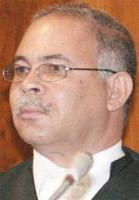







|
News and Information
TREASON APPEAL THROWN OUT OF COURT
| October 27, 2010 |
 Press Releases: TREASON APPEAL THROWN OUT OF COURT Press Releases: TREASON APPEAL THROWN OUT OF COURT
--------------------------------------------------------------------------------
By WERNER MENGES*
THE State’s attempt to be allowed to use alleged confessions made by some of the men accused in the main Caprivi high treason trial as evidence in the trial ended with a final defeat in the Supreme Court yesterday.
In a ruling given by Acting Judges of Appeal Johan Strydom, Simpson Mtambanengwe and Pius Langa, an appeal that the prosecution in the treason trial lodged against part of a ruling that was given by Judge Elton Hoff on March 1 was struck off the court roll. Reasons for the court’s ruling will be provided later, Judge Strydom said. Yesterday’s decision is the second loss that the prosecution in the main treason trial has suffered in the Supreme Court this year.
On June 9, the court also ruled against an attempt by the prosecution to widen the then-pending appeal against Judge Hoff’s ruling of March 1.The main treason trial has not proceeded over the past seven months, as the outcome of the pending appeal was first being awaited.
With the ruling of March 1, Judge Hoff declared that statements that 26 of the men on trial before him made to magistrates after their arrest are not admissible as evidence in the trial.
Some of the accused claimed to have been assaulted by the Police before they made the statements, and it was based on these claims that statements made by them were ruled inadmissible.
With respect to twelve of the statements, those alleged confessions were ruled inadmissible because the suspect who made the statement had not been informed that he had a right to apply for State-funded legal aid before the statement was made. With regard to his ruling on those twelve statements only, Judge Hoff on April 1 gave the prosecution the green light to appeal to the Supreme Court.
The State’s bid to widen that appeal to also include the other disallowed statements resulted in its first Supreme Court defeat on June 9. Yesterday, the three Acting Judges of Appeal asked the lawyers appearing before them to address them first on the issue whether the subject matter of the appeal could actually be taken on appeal at this stage of the trial. The appeal did not progress further than those arguments.
Deputy Prosecutor General Danie Small argued that Judge Hoff himself has indicated that his ruling in respect of the twelve statements ruled inadmissible on the legal aid point alone would not be changed as the trial continues. That means that his ruling on those statements was in effect a final ruling, which the State should then be able to appeal against, he argued.
Small told the three judges that the next set of evidence that the prosecution wants to present in the trial deals with scenes that were pointed out by some of the accused men after their arrest. Since the legal aid issue could also arise in this next phase of the trial, a ruling that the Supreme Court gives on the appeal would have an effect on the rest of the trial, Small said.
Both Jonathan Samukange and Hennie Krüger, who are some of the defence lawyers involved in the trial over the past seven years, argued that Judge Hoff’s ruling of March 1 was in fact not a final ruling, but could be revisited and changed by the judge himself if other evidence that would warrant such a change comes to light during the remainder of the trial.
Samukange told the court that the State could not argue that Judge Hoff’s ruling is cast in stone and that the judge could not still change his mind. The prosecution should not have continued with the appeal after the Supreme Court’s reasons for its ruling of June 9 were handed down six weeks ago, Samukange added.
In those reasons – written by Judge Strydom – the court decided that although the treason trial is not an ordinary, run-of-the-mill kind of case, due to its magnitude in the number of accused persons and the number of charges and witnesses involved, that factor alone is not sufficient to warrant a departure from the general rule that an appeal cannot be pursued before a trial is finalised.
The prosecution’s complaint that the trial judge excluded evidence which should have been allowed is no exceptional matter which would be a reason why the State should be allowed to appeal to the Supreme Court at this stage of the trial, the court indicated in its reasons.
The trial, in which 113 men are remaining in the dock on a total of 278 charges, is now scheduled to return to court on Monday next week. The accused men are being prosecuted in connection with an alleged conspiracy to stoke an armed separatist rebellion in the Caprivi Region between January 1992 and December 2002.
*Courtesy: The Namibian online, October 26 2010
|
Source: wwww.nshr.org.na |
| http://www.nshr.org.na/index.php?module=News&func=display&sid=1458 |
|
| Support Caprivi Freedom |
Fill out the form below to become a member of this site and receive our regular newsletter.
|

|

